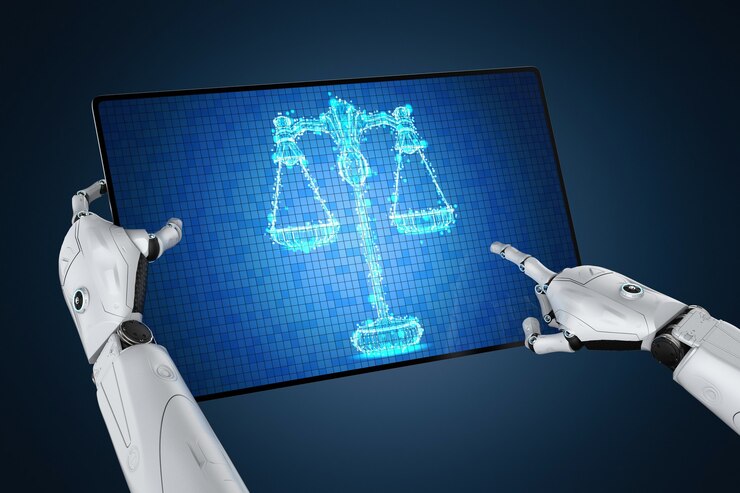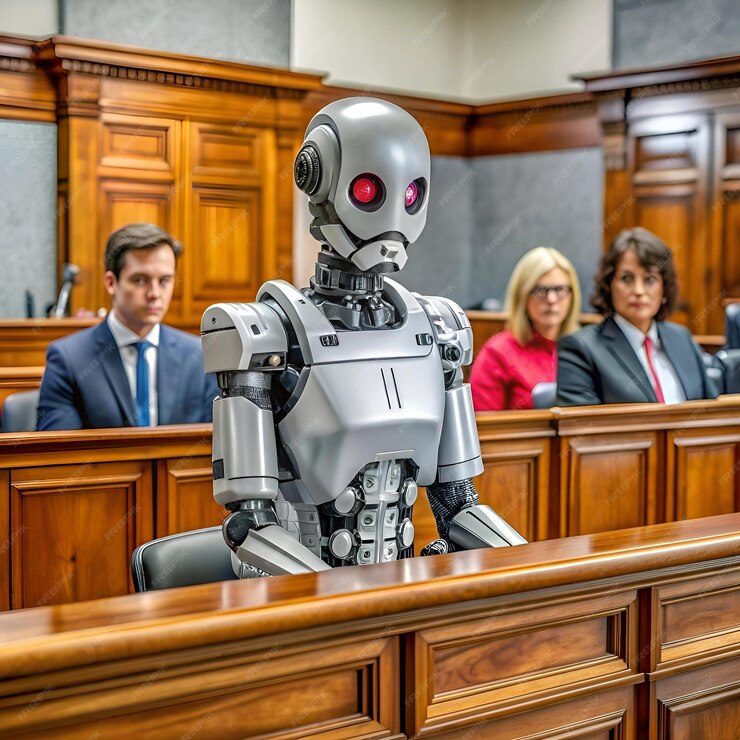



The term artificial intelligence (AI) has gained popularity in a variety of fields, including criminal law. The application of AI to criminal law has generated both enthusiasm and anxiety due to technological breakthroughs. Is AI a game-changing weapon for justice, or does it bring with it new dangers and moral quandaries? In addition to analysing AI’s potential as a game-changer, this piece examines seven potent ways it already changing criminal law.
AI In Criminal Law The potential of artificial intelligence to improve investigations is one of the most important effects on criminal law. Compared to humans, AI algorithms can analyse enormous amounts of data considerably more quickly, finding connections and patterns that might not be immediately apparent. For example, AI In Criminal Law can evaluate digital evidence to find vital information in criminal cases, such as phone records, social media activity, and surveillance film.
It is revolutionary for law enforcement agencies to be able to quickly sort through massive datasets. They can solve cases faster and more effectively thanks to it, which could result in life savings and a quicker prosecution of offenders. But using AI In Criminal Law for criminal investigations also brings up privacy issues and the risk of biassed results if the algorithms are not properly developed and overseen.
For instance, predictive policing
One area where AI is having a big impact on criminal law is predictive policing. Artificial intelligence ( AI In Criminal Law) can more efficiently allocate resources to law enforcement by analysing crime data and forecasting future crime hotpots. This strategy can be quite successful in reducing crime, but it also raises concerns about the possibility of discrimination, including racial profiling.
For More Information Click Here

Another field where AI In Criminal Law is shown to be a useful tool is legal research. Legal research has historically been a labor-and time-intensive procedure. To acquire pertinent information for their cases, solicitors and legal researchers have had to comb through many legal papers, case law, and statutes. This is being changed by AI In Criminal Law in criminal law, which is automating a large portion of the research process.
Legal research tools using artificial intelligence (AI) capabilities may swiftly search and evaluate enormous databases of legal material to find pertinent cases, statutes, and precedents. This helps lawyers create stronger arguments by increasing the accuracy of legal research and saving time. By examining past case data, AI In Criminal Law can also help anticipate how legal battles would turn out.
For More information Click Here
One crucial component of criminal law is sentencing, and artificial intelligence is becoming more and more significant in this field. Through the analysis of pertinent data and criteria including the seriousness of the offence committed, the defendant’s prior criminal history, and others, AI In Criminal Law systems can help judges determine appropriate penalties. Ensuring fair and consistent sentencing is the aim.
Tools for Risk Assessment, for instance
AI In Criminal Law-powered risk assessment instruments are sometimes used by courts to assist in deciding whether to grant bail or release a criminal on parole. These instruments evaluate the risk that an offender will commit another crime or skip court. Although these resources can offer insightful information, they are not perfect and have drawn criticism for possibly fostering preexisting prejudices in the criminal justice system.
The application of AI to criminal law also helps defence lawyers. AI In Criminal Law can help defence teams with a variety of tasks, including case preparation and legal research. AI-powered technologies, for example, can assist lawyers in spotting holes in the prosecution’s case, proposing possible defences, and even modelling the jurors’ responses to certain points of contention.
AI can also assist defence lawyers in comprehending the evidence against their clients more effectively. Artificial intelligence (AI) can find discrepancies or mistakes that could be used to refute the prosecution’s case by examining forensic evidence, digital records, and other data. This degree of study can be especially helpful in complicated situations where more conventional approaches might miss important facts.
AI In Criminal Law and forensic analysis, for instance
Artificial Intelligence is becoming more and more prevalent in criminal law forensic analysis, especially in fields like digital forensics and DNA testing. Artificial intelligence (AI) has the ability to discover previously unidentified suspects or exonerate unfairly condemned individuals by analysing DNA evidence faster and more correctly than human experts. Artificial intelligence (AI) in digital forensics can assist defence lawyers in finding evidence that might have gone unnoticed, including concealed or erased information on a defendant’s devices.
Although artificial intelligence (AI) has many advantages for criminal law, there are also big ethical issues. The possibility of bias in AI algorithms is one of the most important worries. prejudices, such as racial or socioeconomic ones, may be maintained in the judgements made by AI systems if the data used to train them has such prejudices.
A further ethical worry is AI In Criminal Law decision-making’s lack of openness. Because AI algorithms can be quite complicated, it might be challenging for humans to comprehend how they reach particular results. Given the importance of accountability and openness in criminal law, AI’s “black box” nature may provide challenges.
Artificial Intelligence is starting to change the way legal practitioners are trained as it becomes increasingly common in criminal law. To prepare upcoming solicitors for a world in which artificial intelligence plays a crucial role in legal practice, law schools and legal training programs are starting to integrate technology and artificial intelligence into their curricula.

AI is being used to investigate international crimes, including war crimes. AI In Criminal Law is capable of identifying possible war crimes and human rights breaches, for example, by analysing social media posts, satellite photos, and other digital data. By helping international investigators gather evidence and compile cases against offenders, this technology may expedite the process of apprehending war criminals.
The use of artificial intelligence technologies in the criminal justice system is known as AI in criminal law. This can involve everything from automated legal research to predictive policing driven by AI, and even AI-assisted sentencing. Artificial intelligence (AI) is being utilised more and more to evaluate massive information, spot trends, and offer insights that would take human investigators or attorneys a lot longer to find. The criminal justice system hopes to increase accuracy, decrease human error, and boost efficiency in legal procedures by utilising AI.
By using algorithms that can handle and analyse massive volumes of data in a fraction of the time it would take humans, artificial intelligence (AI) improves criminal investigations. Here’s how to do it:
Analysis of Data: Artificial intelligence ( AI In Criminal Law) has the ability to search through phone logs, social media, digital records, surveillance film, and other types of digital evidence to find important patterns or connections that might be significant in a criminal case.
There are various ethical issues with using AI in criminal law:
Responsibility: If an AI system commits a mistake, who is accountable? It can be difficult to determine who is responsible if an AI-driven judgement results in an incorrect conviction or an unfair sentence for an individual.
Confidentiality: Data mining, surveillance, and other investigative methods using AI may violate people’s privacy. Between preserving public safety and infringing upon civil rights, there is a thin line.
Indeed, artificial intelligence ( AI In Criminal Law ) may be used to forecast criminal behaviour; this is known as predictive policing. This is how it operates:
Installation: These forecasts can then be used by law enforcement to better allocate resources, possibly stopping crimes before they start.
The predictive policing model has been criticised, though. Its detractors claim that it can exacerbate preexisting prejudices and result in over policing particular communities. These forecasts’ accuracy fluctuates as well, and there’s a chance that biassed or inaccurate data will be used to target innocent individuals.
AI is revolutionising legal research, which was hitherto a labour-intensive task:
Language Processing (Natural): AI In Criminal Law systems can go through complicated legal texts and retrieve relevant information by using natural language processing (NLP) to interpret legal language. Legal professionals’ workloads can be decreased by using this technology to draft legal papers.
Legal research is becoming faster, more accurate, and more thorough thanks to AI, which helps attorneys present stronger arguments and gives clients better access to the legal system.
AI is being utilised more and more to help in sentencing judgements, which has important consequences for justice:
Concerns About Bias: The possibility of bias in sentencing algorithms powered by AI raises serious concerns. These algorithms may produce biassed sentencing recommendations if the training data was biassed. Studies have revealed, for instance, that certain AI In Criminal Law systems disproportionately classify persons of colour as high-risk, which can result in longer sentences or the rejection of parole.
Supervision of Humans: The majority of jurisdictions mandate that a human judge consider sentencing recommendations generated by AI. There is continuous discussion on the proper ratio between AI In Criminal Law input and judicial discretion, though there are differences in the degree to which judges depend on AI advice.

Defence lawyers are using AI more and more to help their clients have stronger defences:
Analysis of Case: AI is able to examine the prosecution’s evidence and spot flaws or contradictions that a human lawyer could overlook. This is especially helpful in instances that are complicated and have a lot of evidence.
Legal Research: Defence lawyers can more rapidly and effectively construct stronger legal arguments by using AI tools to locate pertinent statutes, case law, and precedents.
Predictive policing is a contentious use of artificial intelligence (AI) to forecast crime scenes, potential perpetrators, and potential victims. This is how it usually operates:
Analysis of Patterns: The AI examines the data to find patterns and trends that can point to a heightened risk of criminal conduct in particular regions or among particular people.
Predictive policing critics:
Efficaciousness: The efficiency of predictive policing is still up for discussion. Some studies contend that it only causes crime to relocate to other places or exacerbates already-existing inequities, while others show that it can actually lower crime.
The Use of AI in International Criminal Law ### **9.
AI is being employed more and more in international criminal law, where it can help with managing complex cases and investigating war crimes. Here are a few applications of AI in action:
Border-Crossing Problems: International criminal law’s use of AI must negotiate the nuances of several legal frameworks and cultural norms. Artificial intelligence systems need to be modified to account for the possibility that evidence that is accepted in one nation may not be in another.
There are various legal and regulatory issues that need to be resolved when integrating AI In Criminal Law into criminal law.
Responsibility: Ascertaining the responsible party in the event of an error by an AI system is among the most formidable obstacles. It can be challenging to apportion blame if someone is unfairly convicted based on a recommendation made by artificial intelligence.